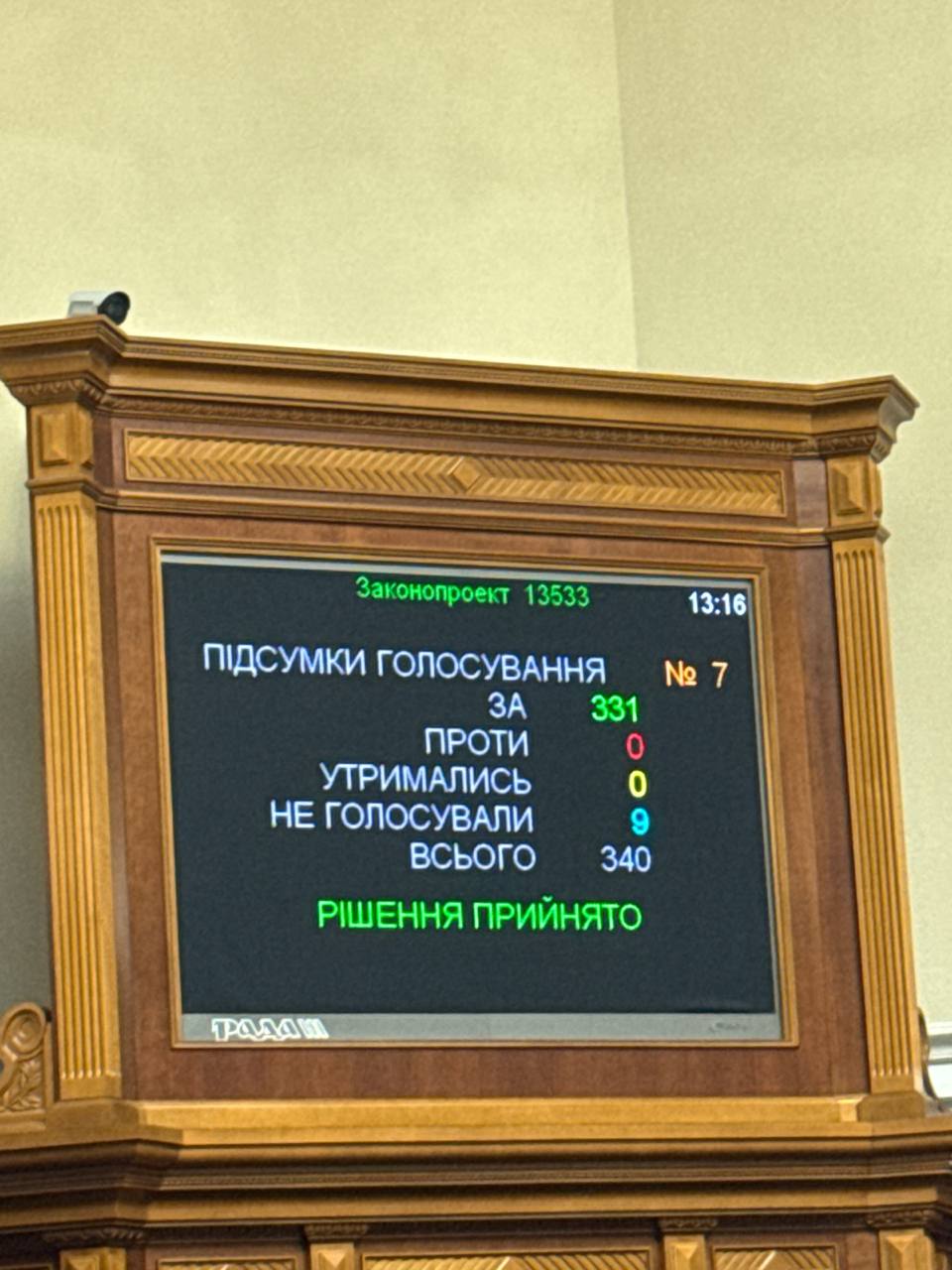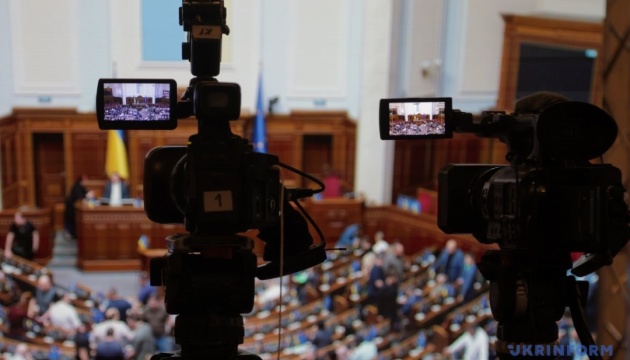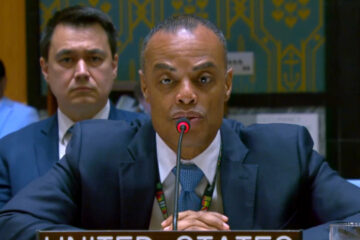The Verkhovna Rada has approved the draft law submitted by President Volodymyr Zelensky on restoring the independence of the National Anti-Corruption Bureau (NABU) and the Specialized Anti-Corruption Prosecutor’s Office (SAP).
This was reported by a correspondent for Ukrinform.
Legislative initiative No. 13533 was supported by 331 MPs.
The explanatory note states that the version of the Criminal Procedure Code of Ukraine, which was adopted by parliament on July 22, contains potential risks for the effective functioning of the anti-corruption infrastructure in Ukraine, in particular regarding the independence of the National Anti-Corruption Bureau of Ukraine and the Specialized Anti-Corruption Prosecutor’s Office.

Photo: t.me/yzheleznyak
The law aims to guarantee the institutional independence of NABU and SAP, as well as to ensure reliable protection of their activities from the influence and interference of the aggressor state.
The document also contains provisions aimed at consolidating the status of the Specialized Anti-Corruption Prosecutor’s Office as a body that independently conducts procedural management of investigations into crimes falling under the jurisdiction of NABU.
At the same time, the provisions of the law propose a mechanism to prevent intelligence and subversive activities by foreign special services against employees of anti-corruption bodies.
The document introduces new preventive and counterintelligence mechanisms to protect anti-corruption agencies from possible influence by an aggressor state.
The law amends the criminal procedure legislation with the aim of strengthening the institutional independence of the SAP and NABU, as well as introducing additional safeguards against possible influence of the aggressor state on anti-corruption bodies.
The initiative provides that the Prosecutor General (or the person performing his duties) will have the right to give written instructions to the head of the pre-trial investigation body, with the exception of the detective units and the internal control unit of the NABU. At the same time, the Deputy Prosecutor General – Head of the SAP, his first deputy or deputy will have the power to amend, supplement or withdraw appeals and cassation complaints, as well as applications for review of court decisions submitted by them personally or by SAP prosecutors.
The Prosecutor General is granted the right to assign another pre-trial investigation body to investigate crimes falling under the jurisdiction of the Economic Security Bureau of Ukraine (ESB) in the event of the ESB’s ineffective work or inability to function during martial law.
The Prosecutor General is also granted the authority to assign the ESB to investigate cases that fall under the jurisdiction of other bodies. At the same time, the draft law prohibits the transfer of NABU cases to other pre-trial investigation bodies, except in cases where NABU is effectively unable to function. In such cases, only the Prosecutor General or the head of the SAP may make the relevant decision.
In addition, the law stipulates that the heads of pre-trial investigation bodies are obliged to comply with the written instructions of the prosecutor, and failure to do so will result in liability. The exception is cases handled by NABU detectives, who are required to comply only with written instructions from the SAP prosecutor.
Failure to comply with such instructions is grounds for removing the detective from the investigation.
The initiative provides that operational units (the National Police, the Security Service of Ukraine, NABU, the State Bureau of Investigation, the Bureau of Economic Security, border guards, the penitentiary system, etc.) carry out investigative and covert investigative actions on the written orders of an investigator, inquiry officer, or prosecutor. NABU units will only do so upon written instructions from a detective or prosecutor of the SAP.
In turn, the SAP prosecutor is granted the right to recognize certain proceedings as subject to NABU investigation by his or her decision if the criminal offense has caused or could cause serious consequences for human rights or state interests. In this case, NABU detectives will be able to investigate cases under the jurisdiction of other authorities, in agreement with the SAP leadership.
If NABU’s internal control detects crimes related to corruption or abuse of power among its employees (except for the director and his deputies), such proceedings are investigated by NABU detectives.
In the event of a dispute over which authority has jurisdiction over a particular proceeding, the decision shall be made by the head of the higher-level prosecutor’s office.
If the case may fall under the jurisdiction of the NABU, the dispute shall be resolved by the Prosecutor General or the head of the SAP. If the proceeding may fall under the jurisdiction of the ESB, only the Prosecutor General may resolve the dispute.
The law specifies that in exceptional, urgent cases, a prosecutor, investigator, or inquiry officer may enter a person’s home or other property without a court order if this is necessary to save people or immediately pursue a suspect.
It is stipulated that the prosecutor’s decision to close a case against a specific suspect does not prevent the investigation from continuing within the same criminal proceedings.
It is also possible to extend the term of the pre-trial investigation to 12 months by decision of the investigating judge, if the relevant motion is approved by the Prosecutor General or his deputies.
The law clarifies the procedure for approving plea agreements in proceedings under the jurisdiction of NABU. Such an agreement is concluded with the mandatory approval of the SAP leadership in cases involving misdemeanors, minor, serious, or particularly serious crimes.
At the same time, a special procedure for criminal proceedings against the director of NABU and its employees is established. Notification of suspicion to a member of parliament, presidential candidate, human rights commissioner, NABU leaders, SAP prosecutors, and other high-ranking officials is carried out by the Prosecutor General or the head of SAP.
The document also establishes the independence of SAP prosecutors. The Prosecutor General, his first deputy, and deputies will not have the right to give instructions to SAP prosecutors or otherwise interfere in their work. Administrative orders regarding the organization of SAP’s work are issued only with the consent of its head.
At the same time, additional security measures are being introduced to verify the integrity and loyalty of employees of key law enforcement and anti-corruption agencies.
In particular, the internal control units of the NABU, SAP, ESB, the Office of the Prosecutor General, the DBR, and the National Police must conduct polygraph (lie detector) tests on their employees who have access to state secrets at least once every two years.
Such investigations will be carried out using a methodology agreed with the SSU and will be aimed at identifying possible actions in favor of the aggressor state.
At the same time, the law obliges the Security Service of Ukraine to conduct a check of all such employees — that is, those who have access to state secrets in the specified bodies — for possible cooperation with the aggressor state within six months of the law coming into force.
The document also obliges the Office of the Prosecutor General and the Ministry of Justice to intensify their efforts to search for and return to Ukraine persons who are hiding abroad from investigation, trial, or punishment.
If necessary, within three months of the law coming into force, they must, together with the Cabinet of Ministers, prepare and submit to the Verkhovna Rada appropriate amendments to the legislation to increase the effectiveness of extradition cooperation with other states.
The law also excludes a number of provisions from the current legislation that provide for special powers of the Prosecutor General and the application of a special procedure for criminal proceedings to certain categories of officials.
In particular, provisions that gave the Prosecutor General (or the person performing his duties) the right to appoint first deputies and deputies of the Prosecutor General, including the head of the Specialized Anti-Corruption Prosecutor’s Office, as prosecutors in specific criminal proceedings.
The provision allowing their powers to be delegated to other prosecutors exclusively by decision of the Prosecutor General has also been removed.
The law excludes the provision that disputes over jurisdiction in cases that may fall under the jurisdiction of NABU or the Economic Security Bureau of Ukraine are resolved by the Prosecutor General. This eliminates the potential risk of administrative interference in determining the jurisdiction of anti-corruption cases.
In addition, the document abolishes the provision that allowed participants in proceedings to submit motions directly to the Prosecutor General to close criminal proceedings in cases involving the highest officials of the state and local self-government, judges, prosecutors, law enforcement officials, and heads of state-owned enterprises. This is aimed at preventing political or administrative influence on the completion of such investigations.
The provision stipulating the application of special criminal proceedings to officials such as the Prime Minister, ministers, their deputies, the leadership of the National Agency for Corruption Prevention, the State Bureau of Investigation, the Bureau of Economic Security, senior civil servants (category “A”) and other high-ranking officials has also been excluded. This decision aims to ensure equality before the law and prevent abuse of special procedural guarantees.
As reported by Ukrinform, on July 22, the Verkhovna Rada passed a law reducing the powers of the NABU and SAP. On the same day, President Volodymyr Zelensky signed it.
Rallies against the new law were held in Kyiv and other cities of Ukraine.
On July 24, Zelensky approved the text of a bill on the independence of the anti-corruption infrastructure, which the Verkhovna Rada is to consider on July 31.
On July 25, activists in Kyiv called on Ukrainians to gather on Wednesday, July 30, as well as on the day of the vote, July 31, to show MPs that they expect a “fair decision” from them.
Photo: Facebook / Ruslan Stefanchuk, illustrative
Source: Verkhovna Rada passes law restoring NABU and SAP independence




